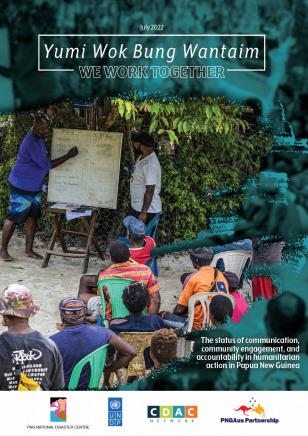Yumi wok bung wantaim (We work together)

Yumi wok bung wantaim (We work together)
July 18, 2022
Papua New Guinea, a country of diverse cultures and social values, and distinct tribal boundaries, presents unique humanitarian challenges, which are heightened in the absence of systematic communication, community engagement and accountability (CCEA) approaches. There is a tendency for response efforts to be pushed through with minimal community engagement, and this can lead to ‘tick-box’ approaches that can have minimal impact on people’s lives.
The United Nations Development Programme (UNDP) and CDAC Network have undertaken this scoping study on the status of CCEA towards affected populations in Papua New Guinea, to provide recommendations for a strengthened and more inclusive CCEA system.
Summary of key recommendations
For the Disaster Management Team (collective level): Disaster Management Team members should demonstrate their commitment to accountability to affected populations by measuring how well programme interventions meet the affected population’s expectations around quality, effectiveness and expected results. Member organisations should ensure funds are allocated for coordinated participation mechanisms in humanitarian response plans.
For the Inter-Cluster Coordination Group (collective level): Establish a diverse, multi-stakeholder community engagement working group that supports Clusters’ CCEA efforts and liaises closely with the UN Communications Group and any information management working group. The community engagement working group should provide overall leadership in advocating for CCEA and addressing related gaps identified in this study.
For Disaster Management Team members (organisational level): Member organisations should work to improve CCEA collaboration among key response organisations and agencies, in order to enhance the sharing of good practices and establish a common approach to data-sharing, feedback and complaints (including sexual exploitation and abuse reporting) systems, needs assessment and community disaster readiness and response planning.
For the Government of Papua New Guinea: In addition to integrating CCEA into national and subnational legislation, policies and plans, the government should undertake a stocktake of and invest in upgrading and expanding the nationwide VHF and HF radio network and mobile phone network coverage as a priority. This should be accompanied by pursuing opportunities to expand broadcast radio coverage, as well as affordable and accessible internet services, including planning for repair and maintenance, particularly in disaster- and conflict-prone locations.
For donors: Donors should lead and support advocacy for more consistent and systematic CCEA with disaster-affected communities. Donors should also provide flexible funding for collective initiatives, in line with existing Grand Bargain commitments, and support the identification of relevant synergies across existing humanitarian and development programming.
Papua New Guinea, a country of diverse cultures and social values, and distinct tribal boundaries, presents unique humanitarian challenges, which are heightened in the absence of systematic communication, community engagement and accountability (CCEA) approaches. There is a tendency for response efforts to be pushed through with minimal community engagement, and this can lead to ‘tick-box’ approaches that can have minimal impact on people’s lives.
The United Nations Development Programme (UNDP) and CDAC Network have undertaken this scoping study on the status of CCEA towards affected populations in Papua New Guinea, to provide recommendations for a strengthened and more inclusive CCEA system.
Summary of key recommendations
For the Disaster Management Team (collective level): Disaster Management Team members should demonstrate their commitment to accountability to affected populations by measuring how well programme interventions meet the affected population’s expectations around quality, effectiveness and expected results. Member organisations should ensure funds are allocated for coordinated participation mechanisms in humanitarian response plans.
For the Inter-Cluster Coordination Group (collective level): Establish a diverse, multi-stakeholder community engagement working group that supports Clusters’ CCEA efforts and liaises closely with the UN Communications Group and any information management working group. The community engagement working group should provide overall leadership in advocating for CCEA and addressing related gaps identified in this study.
For Disaster Management Team members (organisational level): Member organisations should work to improve CCEA collaboration among key response organisations and agencies, in order to enhance the sharing of good practices and establish a common approach to data-sharing, feedback and complaints (including sexual exploitation and abuse reporting) systems, needs assessment and community disaster readiness and response planning.
For the Government of Papua New Guinea: In addition to integrating CCEA into national and subnational legislation, policies and plans, the government should undertake a stocktake of and invest in upgrading and expanding the nationwide VHF and HF radio network and mobile phone network coverage as a priority. This should be accompanied by pursuing opportunities to expand broadcast radio coverage, as well as affordable and accessible internet services, including planning for repair and maintenance, particularly in disaster- and conflict-prone locations.
For donors: Donors should lead and support advocacy for more consistent and systematic CCEA with disaster-affected communities. Donors should also provide flexible funding for collective initiatives, in line with existing Grand Bargain commitments, and support the identification of relevant synergies across existing humanitarian and development programming.

 Locations
Locations